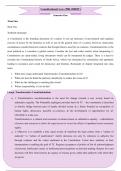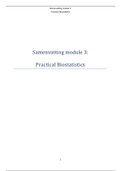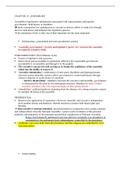Semester One
Term One
Week One
Textbook Summary:
A Constitution is the founding document of a nation. It sets up structures of government and regulates
exercise of power by the branches as well as sets of the general rules of a country. However, democratic
constitutions consider historical contexts that brought about a need for its existence. Constitutional law is the
most political as it considers a global context. Consider the text and wider context when interpreting it.
Constitutions are open-ended, living documents which can be interpreted by judges. There is a need to
consider the Constitutional history of South Africa, which was dominated by colonialism and apartheid,
leading to resistance and a need for democracy and freedom. Remainder of chapter integrated into class
notes.
1. What does Langa understand Transformative Constitutionalism to be?
2. What role does he think the judiciary should play to realise the vision of it?
3. What are the challenges to realising this vision?
4. Whose responsibility is it to do this?
Langa: Transformative Constitutionalism
1: Transformative constitutionalism is the need for change towards a new society based on
substantive equality. The Postamble (epilogue) provides basis for TC – the constitution is described
as historic bridge between past of deeply divided society & a future founded on recognition of
human rights, democracy, peaceful co-existence, & the development of opportunities for all.
CHANGE is at the core.
Transformation is a cultural and economic revolution based on substantive equality – redistribution
of power and resources to allow for equal access to revert the effects of apartheid (socio-economic
rights).
2: Objective is to establish a truly equal society & transform the legal culture from a "culture of
authority" to "culture of justification". Justify decisions not only by reference to authority but
through evidence and the values enshrined in the Constitution. Courts have authority in their
interpretation to enabling the goal of TC. Requires acceptance of politics of law & acknowledgment
of personal, intellectual, moral, or intellectual preconceptions on decision-making. Respect for court
decisions will flow from honesty & cogency of reasons given, rather than authority with which they
are given.
,Some critical scholars view bridge interim Constitution as space between unstable past & uncertain
future, rather than a temporary phenomenon that ends when all have equal access to resources &
basic services. It is permanent ideal; a way of looking at world that creates space for dialogue &
contestation & new ways of being to be explored & created.
Sees Constitution as not transformative due to historical position or particular socio-econ goals, but
as it envisions society that is always open to change, contestation & is always defined by
transformation.
3: Challenges facing transformative constitutionalism:
Access to equal justice essential to achieving substantive equality & improving socio-econ
conditions. Continuing disparities of wealth & power in country hinder this.
Legal representation remains beyond financial reach of many, & criminal justice system faces serious
challenges in ensuring that victims of crime have satisfaction in knowing that those who harmed
them are brought to justice. Strategies to rectify these issues include not allowing the Constitution to
become a tool of the rich, & focusing legal education on the constitutional dream.
Traditional legal education should be broadened to encompass the social fabric & its power to
transform society. Change in legal education requires change in mindset, not just change in laws.
Klare discusses the conservatism of the SA legal community – the jurisprudential approach has been
formalistic & technical rather than policy-oriented & consequentialist = hindrance to substantive
reasoning & inquiry into true motivations for decisions. While adherence to rules can be beneficial,
too much formalism obscures the purpose of law to ensure justice.
Judges must strike balance between transformation & adherence to text, & be careful not to overstep
their role as interpreters of law.
Ideal of transformative constitutionalism requires judges to change law to bring it in line with the
values of the constitution, but overly activist judges can be just as dangerous as passive ones.
Transformation is the responsibility of all 3 branches. Social transformation is essential for
reconciliation, & reconciliation is necessary for true transformation. Reconciliation & forgiveness
aren’t something that can be legislated, but require courage & generosity of spirit from those hurt
most.
Moving forward requires remembering & forgetting. There is call for reconciliation & it is
responsibility of both victims & beneficiaries of apartheid to create climate for it. (4)
Mamdani distinguishes between narrow political reconciliation & broader social reconciliation of
entire nation, which focuses on beneficiaries rather than just perpetrators & requires beneficiaries to
take responsibility for ensuring that reconciliation is possible.
Reconciliation fostered most effectively through social justice, which includes levelling of socio-
econ conditions. Reconciliation supplements & requires improvement of socio-econ conditions.
National reconciliation can’t be divorced from reconstruction of socio-econ conditions of country, &
it is a national project that goes beyond the government of the day.
,3: Access to equal justice, legal education and culture, language & cultural barriers,
maintaining the separation of powers while ensuring collaboration among 3 branches, &
reconciliation.
Challenges can also be viewed as enabling conditions for transformation as they provide drive to
overcome them & keep idea alive that things can be diff.
Judiciary, executive and legislature have the responsibility. (4)
- Critical scholars disagree with this opinion (Pretoria crits):
Modiri: Conquest and constitutionalism
Legacy of colonialism, racism, dispossession, & poverty, as well as the failure to achieve concrete
historical justice & true emancipation for black majority continue to undermine constitutional
democracy. Constitution stands in the way of justice! This is not an African constitution. It is rooted
in the knowledge and value systems of the west. Decolonial critique.
European conquest of indigenous people & regime of settler-colonial white supremacy are
foundations of violence & ongoing structural dynamic of social organisation, rather than just
historical events.
Political ontology that places white people at top of hierarchy & black at bottom has created
instability which goes beyond legal & political issues & extends into socio-econ, cultural, & spatial
domains.
Constitutional democracy lacks concrete historical justice & non-realisation of emancipatory
experience of freedom & dignity in lives of black majority.
Critique aims to reconceptualise traditional historical periodisation of constitution & insert black
radical & Africanist imaginaries & vocabularies into legal & political thinking. Calls for
uncompromising demands for concrete justice & fundamental change!
Seeks alternative jurisprudence that would work against conservative positivist thinking, liberal
legalism, & excessively Eurocentric traditions of critical legal theory.
Counter-historical & counter-hegemonic standpoint to gather thinkers & theoretical approaches to
contemplate jurisprudence outside of, & beyond, liberal constitutionalism.
Pervasive culture of constitutionalism, legality, & rights, characterised by excessive faith in
constitution as solution to social problems, almost fetishism. There is a discontinuity between the
past of injustice and the Constitution (continued protection of the rights over private property). The
values in the constitution are not native to the people. Fetishism – this constitution will deliver
constitution. It stops us from reimagining a different way of organising ourselves. Neo-apartheid
culture of constitutionalism.
Fetishisation of law & constitutionality as associated with judicialization of politics, global
hegemony of human rights, & increasing tendency of diff groups to turn to law & courts to represent
themselves.
, This culture of legality is central to production of political culture & conceptions of nationhood &
subjectivity, & is linked to ANC' aspiration towards Eurocentric ideal of nation-state.
Legal & political theology also plays role in fetishising new national constitution as substantive &
symbolic break with past.
Douglas: focus on constitutions as central instruments for production & reconstruction of political
community after conflict comes at expense of alternative imaginations of political community &
denies messy realities of subjectivities & persistent issues of inequality.
Fetishising & over-reliance on constitutions is problematic - not capable of reflexive politics & is
unable to comprehend how deep dark past resulted in unstable conceptions of political community,
particularly around issues of land, race, & culture.
Narrows space for political contestation & removes living memory of SA & its law from view as
artefacts of colonial conquest. Also enables colonial-apartheid to remain pervasive in form of
inequality, poverty, & violence.
Moralism surrounding constitution deifies it, making criticisms of it seem sacrilegious & anti-
politics.
Brown: Legal scholars, activists, & citizens should seek out alternatives to constitutionalism &
Western modernity as instruments for securing justice.
scholarly & public criticisms of constitutionalism in post-apartheid era represent historical re-
opening for emergence of bold articulations of counter-hegemonic theories & politics.
unravelling of constitutional ideals due to social realities & racial & gender stratification, which has
led to ongoing black inequality & effects of global capitalism.
Most people accept terms of constitution but critique jurisprudence, reasoning & government’s
implementation of Bill of Rights, conservative legal culture, & limits of law. Knowledge of modern
constitutionalism has been developed with framework of experiences, institutions, & epistemologies
of North, which marginalises southern law & African jurisprudential approaches in knowledge
production on constitutionalism.
Main proponents of p-apartheid constitutionalism are white, leftist & liberal progressives who
emphasise litigation & judiciary as sites for democratic change.
There are still problems of racial power, voice, & representation that need to be addressed. Social
context marked by white power being insulated in private sphere, while pub face of black.
This has led to overrepresentation of white people in law, activism, & academia, shaping practice &
theory of constitutionalism in context of counter-history of non-racialism.
White ppl's participation in black struggles was driven by 2 interrelated aims: introduction &
normalisation of Africans into Eurocentric pub sphere, & interception of development of autonomous
black radical political subjectivity. This pattern has led to ahistorical & de-racialising programme
that contributes to framing post-94 black gov as primary source of failings, directing attention away
from economic & cultural power still held by beneficiaries of past.











